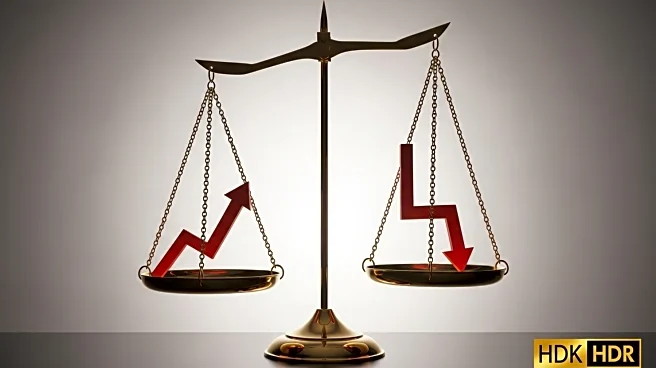What's Happening?
The Federal Reserve is preparing for a significant decision regarding interest rates at its upcoming meeting on September 17, 2025. Economists widely anticipate a rate cut, marking the first reduction of the year. The decision comes amid mounting pressure from President Trump, who has criticized the Fed for not lowering rates sooner, citing muted inflation as a justification. The Fed, led by Chair Jerome Powell, has maintained its independence, emphasizing that its decisions are based on economic data rather than political influence. The central bank is navigating a complex economic landscape, with rising inflation due to tariffs and a slowing labor market, which complicates its dual mandate of controlling inflation and ensuring full employment.
Why It's Important?
The Federal Reserve's decision on interest rates holds significant implications for the U.S. economy. A rate cut could lower borrowing costs for businesses and consumers, potentially stimulating economic activity. However, the decision is fraught with challenges, as the Fed must balance the need to support a slowing labor market against the risk of exacerbating inflation, which has been rising due to tariffs. The outcome of the Fed's decision will impact various sectors, including housing, where high mortgage rates have been a concern. Additionally, the decision will be closely watched by international markets, as it could influence global economic trends and monetary policies.
What's Next?
The Federal Reserve is expected to announce its rate decision at 2 p.m. EST on September 17. The likelihood of a 0.25 percentage point cut is high, with a 96% probability according to CME FedWatch. Economists will also be attentive to any guidance from the Fed regarding future rate cuts at its subsequent meetings in October and December. The decision will be informed by key economic indicators, including inflation and employment data, as the Fed seeks to navigate its dual mandate. The response from President Trump and other political leaders, as well as the reaction from financial markets, will be critical in shaping the economic landscape moving forward.
Beyond the Headlines
The Federal Reserve's decision-making process highlights the tension between economic policy and political pressure. The independence of the Fed is crucial in maintaining credibility and stability in monetary policy. The ongoing debate over tariffs and their impact on inflation underscores the interconnectedness of domestic and international economic policies. The Fed's actions will not only affect the U.S. economy but also have ripple effects globally, influencing trade relationships and economic strategies of other central banks.












